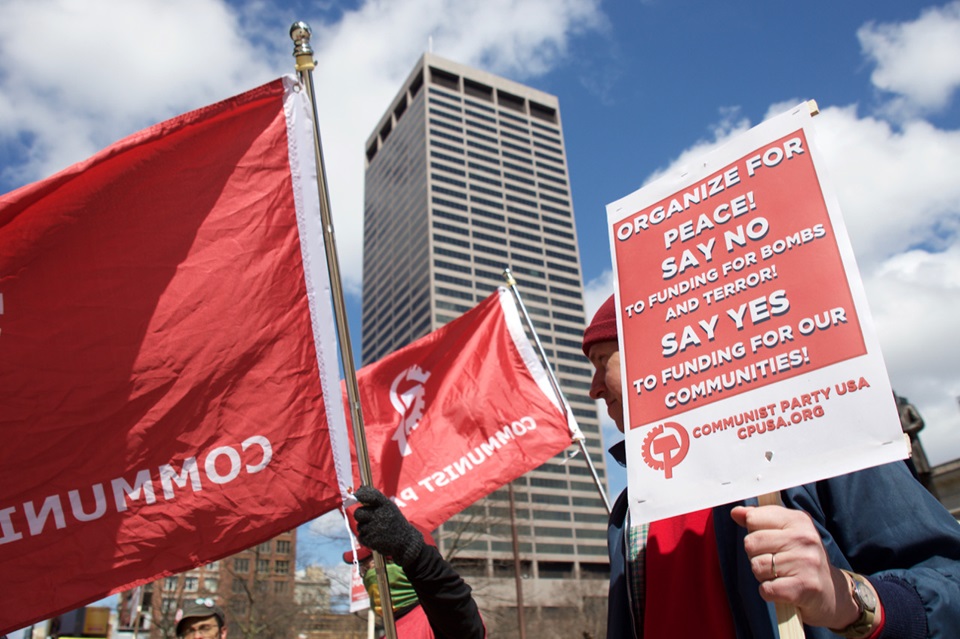
In the aftermath of the October 7 attacks in Israel, more than $300 million flowed from the treasuries of state governments directly into the hands of the Israeli government. The purchase of these bonds was coordinated by the State Financial Officers Foundation, a far-right group connecting elected officials with the highest levels of finance capital.
Bonds essentially function as loans from an individual investor to a government or large corporation. In contrast to a personal loan, bonds are issued under much more favorable conditions to the recipient of the loan.
Government-issued bonds typically repay interest at a far lower rate than your average personal loan. Unlike your car payment, in which you pay back a portion of the original loan (the principle) in addition to monthly interest, bond recipients keep the entire principle until the end of the loan and only repay interest to the lender each month. New bonds are issued when the principle on old bonds is due. Under these terms, governments can maintain vast sums of debt while only repaying a tiny fraction of that debt at any moment in time.
The terms under which bonds are issued vary greatly from one country to the next. Some countries have access to credit at interest rates far below market averages while others are subject to extremely high interest rates, which make bonds expensive and prohibit access to capital for government projects.
Three private credit agencies, Standard & Poor’s, Fitch, and Moody’s set interest rates for the international bond market by publishing credit ratings on countries that issue bonds. All three agencies are based in New York City. Fitch, owned by Hearst Communications, is a multinational media conglomerate which distributed Nazi propaganda around the globe via its newspapers in the 1930s and has consistently supported American military interventions overseas since the 19th century.
While credit agencies present themselves as neutral providers of investment information, even a cursory overview of global credit ratings betrays a system in which allies of American-based finance capital have access to nearly unlimited low-interest bonds. Yet former colonial territories in the Middle East, Africa, and Central and South America can only issue bonds at punitively high interest rates.
Israel has consistently received high credit ratings from all three agencies since the inception of the credit rating system. No country in the Middle East or Africa is able to issue bonds under more favorable conditions.
A country of 9 million people, Israel is deemed by credit agencies to be more capable of repaying its investors than China, a country of 1.4 billion people with a land mass nearly 500 times the size of Israel. The International Monetary Fund forecast for Israel was 3.1% real GDP growth in 2023, compared to 5% real GDP growth for China. Are we to believe that credit agencies serve as neutral arbiters of the ability to repay debt?
Using these principles, SFOF engineered extensive ties between a network of Republican elected officials, state governments, and the Israeli government. Hundreds of millions of dollars, all collected from American workers as taxes, are now tied up in the continued success of the Israeli government. Should the Israeli government default on these bonds, worker pensions, public services, and other state-held resources would be at risk.
Many state governments are now major investors in the state of Israel. For example, in 2023 Ohio State Treasurer Robert Sprague announced the purchase of $20 million in bonds issued by Israel. These bonds will yield an interest rate of 4.46% over 5 years – profits derived in part from ongoing Israeli militarism and the dispossession of the Palestinian people.
In total the state has purchased $202.5 million in bonds supporting the government of Israel, making Ohio one of the largest government holders of these bonds in the United States. “With their competitive interest rates and strong record of reliable payments, Israel Bonds continue to be a valuable investment for Ohioans,” said Sprague after the most recent bond purchase by the state, citing data from Standard & Poors, Fitch, and Moody’s credit agencies.
Increased investments in Israeli bonds
At least 12 states (FL, IN, NY, OH, PA, TX, AK, GA, IL, LA, OK) have increased their investments in Israeli bonds since October 7. All 12 states have elected financial officials who are members of the State Financial Officers Foundation (SFOF). According to its website, SFOF advocates for limited government, austerity policies, and fiscal responsibility in state governments. SFOF has strongly opposed campaigns for environmental and social responsibility in institutional investments.
Sponsors of SFOF include the Heritage Foundation, the Goldwater Institute, the American Conservative Union, and the American Enterprise Institute. Israel Bonds, the U.S.-based distributor of bonds issued by the Israeli government, is a corporate sponsor of SFOF. Although the complete list of corporate sponsors is no longer published, J.P. Morgan, Wells Fargo, Visa and Mastercard have all sponsored SFOF in the past. The infamous reactionary, union-busting Coors family has also made enormous personal contributions to support SFOF.
In campaigns against social and environmental justice through its institutional investments, SFOF has consistently argued that state officers have a fiduciary duty to focus solely on monetary returns in their investment decisions. Nevertheless, Jimmy Patronis, SFOF member and chief financial officer for the state of Florida, announced $120 million in new bond purchases, citing the need to “assist our allies in Israel both morally and monetarily.” This announcement came despite S&P lowering its credit rating for the state of Israel in the aftermath of the October 7 attacks.
All of these state investments create real, tangible ties between state resources and the outcome of the Israeli-Palestinian conflict. An Israel partitioned between Israelis and Palestinians might be seen by Western investors as less able to repay its debts. Future state treasurers, regardless of their political views on Palestine, would likely feel an obligation to protect the hundreds of millions of dollars in taxpayer money already invested in Israeli militarism.
In tying up state resources in Israeli bonds, states may have committed themselves to continuing political support for the Israeli occupation of Palestine. The bondholder has a vested interest in the success of the entity that issues the bond.
The U.S. ruling class has always acted decisively to protect its overseas investments. The U.S. government maintains close relationships with the most reactionary forces in the Middle East. They support the Israeli occupation of the West Bank and Gaza Strip, refuse to accept the rights of the Palestinian people to form their own autonomous state, and demonize Muslims in Palestine and worldwide.
The U.S. government will provide $3.3 billion in no-questions-asked financial aid to the Israeli military budget, much of which flows back into the hands of American weapons manufacturers such as Lockheed Martin, Boeing, and Northrup Grumman. The vast majority of ammunition used by the IDF is manufactured in the U.S. or by American-owned companies.
In fact, U.S.-made weapons have been used to destroy USAID-funded projects in the Gaza Strip on multiple occasions over the past 10 years in a highly profitable cycle of violence against the Palestinian people. This tragic irony was not lost on the hundreds of State Department employees who bravely signed a public letter of dissent with the Biden administration.
The militaristic Israeli government currently enjoys the full support of the Biden administration, which has stubbornly opposed any suggestion of a ceasefire in the latest war in Gaza. It is clear that the Israeli government is an important investment for American-based finance capital.
Israelis should question whether their allies overseas have their best interests at heart. Not only have decades of weapons purchases by the U.S. government lined the pockets of American weapons manufacturers, but such purchases have not succeeded in establishing real security for the people of Israel, to say nothing of the tragic consequences for the people of Palestine. American credit agencies wasted no time in lowering the credit rating of Israeli bonds after the October 7 attacks, raising interest rates on Israeli debt at the same time the SFOF was lobbying state governments to increase their investments in Israeli bonds.
The current global movement in support of Palestinian liberation demonstrates that the actions of the Israeli government are not universally supported by the working people of the world. The investment of state tax revenue in Israeli bonds diverts working-class resources towards Israeli militarism and yields little real value. A project of divestment from Israeli bonds would free up hundreds of millions of dollars for investment in projects closer to home. Improvements in public education, expanded medicare access, public transportation infrastructure, and public housing are not the most profitable investments for the ruling class. But these investments yield far greater returns for working people than any state-issued security. We need homes, healthcare, and education, not low-interest loans for war against our working-class brothers and sisters overseas.
We hope you appreciated this article. At People’s World, we believe news and information should be free and accessible to all, but we need your help. Our journalism is free of corporate influence and paywalls because we are totally reader-supported. Only you, our readers and supporters, make this possible. If you enjoy reading People’s World and the stories we bring you, please support our work by donating or becoming a monthly sustainer today. Thank you!












Comments